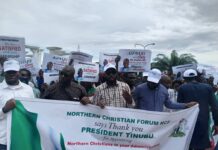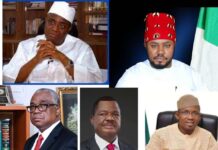Life and Times of Shehu Shagari, Second Republic President of Nigeria [1925 – 2018]
“I regret announcing the death of my grandfather, H.E Alhaji Shehu Shagari, who died right now after a brief illness at the National Hospital, Abuja,” the younger Shagari said on his Twitter handle.
With this announcement, a political page in the history of modern democracy has been brought to a close. As expected, encomiums are already pouring in and crocodile tears are flowing through the political firmament.
When his grandson Bello Shagari announced his death via a saddening tweet, the reactions to the news suggest a revered man has passed on.
Shagari was a man of gigantic accomplishments in almost all spheres of life, especially in activities bordering on politics and leadership. Indeed, he was a man who made his presence felt in all aspects of public life, at different times serving the country at state and federal levels as local government councillor, state commissioner, member of the Constituent Assembly and to top it all, First Executive President of Nigeria
Though well advanced in age, the death of Second Republic President of Nigeria, Alhaji Shehu Shagari, on Friday did not fail to elicit reactions of regret and sorrow across a broad spectrum of the Nigerian populace. The reason for this is not far to seek. Shehu Shagari Shehu Shagari The humble and unassuming elder statesman was a major participant in the history making processes of Nigeria’s development right from the First Republic to the day he eventually surrendered to the cold hands of death at the ripe age of 93.
Shehu Shagari attended Korani School, elementary school in Yabo, Sokoto Middle School and Kaduna College. Showing early interest to be a science teacher, he later took an administrative course at Bauchi Teachers College and in the United Kingdom under the sponsorship of the British Council. Shehu Shagari a rare gem – Ishaku
But in spite of this interest in teaching, it was not long before his interest in politics became evident. It all began in 1945 when he organised a youth social circle which mobilised youth against British imperialism.
Thereafter, he became the founder-member of the Northern Peoples Congress, NPC. Subsequently, he took part in all the conferences that gave birth to the Richard and Mcpherson Constitutions at both federal and regional levels. His participation in all these political processes obviously paid dividends as he won elections to represent Sokoto West in the Federal House of Representatives in 1954. It did not stop there.
From 1954 to 1958, he was a member of the Federal Scholarship Board. In the same 1958, he attended a parliamentary course at Westminster, London which enabled him to obtain a certificate in parliamentary procedure.
The reward for this was that on his return to Nigeria, he was appointed Parliamentary Secretary to the Prime Minister. Other appointments soon followed as following his re-election into the Federal parliament in 1959, he was immediately appointed the first Federal Minister of Economic Development.
He later became the Minister of Establishment and Training and was credited for making great efforts to Nigerianise the civil service. He also served as minister in many other departments. Following the 1966 coup and its disastrous after effects, Shehu Shagari was forced to return to his 400 acre farm at Shagari and subsequently took up his first love: education.
THOUGH he is more popularly known as a foremost politician and ultimately Nigeria’s only president during the second republic, Shehu Usman Aliyu Shagari was also many other things prior to his passing on Friday at the age of 93.
Born to Aliyu and Mariamu Shagari on February 25, 1925, he hails from Shagari, a village (now local government area) in Sokoto State. The village was founded by Ahmadu Rufa’i, his great-grandfather, who headed the village and adopted its name also as his family name.
Shagari is the sixth child in a polygamous family. His father, who later became the Magajin Shagari (Head of the Village), was a herder, farmer, and also engaged in trading activities. He died in 1930, five years after the birth of Shagari, and Bello, the young Shagari’s elder brother, had to take over as the village head.
Before venturing into politics in 1951 and his election into the federal House of Representatives three years later, Shagari was a teacher. He remained a professor at the college after obtaining his degree. He also taught in several other places, including the Middle School in Sokoto as a Professor of Science.
He was appointed as the director of a primary school in Arungu in 1951. In 1953, he travelled to the United Kingdom and spent a year in the country to complete his teacher training programme.
In all, he got married to three wives: Amina, Aishatu and Hadiza, with whom he had several children, including Captain Muhammad Bala Shagari, his eldest son and a retired captain of the Nigerian Army, and Aminu Shehu Shagari, who represents the Shagari/Yabo federal constituency at the House of Representatives. Aishatu Shagari died in a hospital in London after a brief illness on August 24, 2001.
After his early education, he worked as a teacher for a brief period before entering politics in 1951.
Shagari was educated at Kaduna College and taught school briefly. As one of the few northerners to show an interest in national politics, he ran for office in 1954 and was elected to the federal House of Representatives. Thereafter he held several posts and was a member of every administration after Nigeria’s independence in 1960. After a military coup in 1966 ended civilian government, he retired to his hometown.
Shagari also served seven times in a ministerial or cabinet post as a federal minister and federal commissioner from 1958–1975.
Shagari entered politics in 1951 when he became the secretary of the Northern People’s Congress in Sokoto, Nigeria, a position he held until 1956.
In 1954, Shagari was elected into his first public office as a member of the federal House of Representative for Sokoto west.
In 1958, Shagari was appointed as parliamentary secretary (he left the post in 1959) to the Nigerian Prime Minister, Sir Abubakar Tafawa Balewa and that year he also served as the Federal Minister for Commerce and Industries.
From 1959-1960, Shagari was redeployed to the ministry for economic development, as the Federal Minister for Economic Development.
In 1960-1962, he was moved to the Pensions ministry as the Federal Minister for Pensions. From 1962-1965, Shagari was made the Federal minister for internal affairs. From 1965 up until the first military coup in January 1966, Shagari was the Federal Minister for works.
In 1967 he was appointed as the secretary for Sokoto province education development fund.
From 1968-1969, Shagari was given a state position in the North Western State as commissioner for establishments.
After the Nigerian civil war, from 1970-1971, Shagari was appointed by the military head of state General Yakubu Gowon as the federal commissioner for economic development, rehabilitation and reconstruction.
From 1971-75 he served as the Federal commissioner (a position now called minister) of finance. During his tenure as the commissioner of finance for Nigeria, Shagari was also a governor for the World Bank and a member of the International Monetary Fund (IMF) committee of twenty.
In 1978, Shehu Shagari was a founding member of the National People’s Party. In 1979 Shagari was chosen by the party as the presidential candidate for the general election that year, which he won becoming the president and head of state of the Federal Republic of Nigeria.
Shagari ran for a second four-year term in 1983 and won the general election, however, on 31 December 1983, Shagari was overthrown by major general Muhammadu Buhari.
Shagari won the 1979 election with the help of his campaign manager, Umaru Dikko. The campaign had the support of many prominent politicians in the North and among southern minorities. The party’s motto was “One Nation, One Destiny” and was seen as the party best representing Nigeria’s diversity.
During the oil boom, Shagari made Housing, Industries, Transportation and Agriculture as the major goals of his administration. In transportation, he launched some road networks across the country.
He also initiated a program to foster the use of mechanical machinery in farming. It favoured large-scale farmers in order to produce mass products. Shagari created a low-cost housing scheme.
In 1980, with the oil revenue, Shagari finished building the Kaduna refinery, which started operation that year. Also with the oil revenue, Shagari concluded the construction of an additional steel plant and three rolling mills at Ajaokuta, Nigeria.
Shagari completed the Delta Steel complex in 1982. In 1983, Shagari created the Aluminum Smelter Company of Nigeria at Ikot Abasi, Nigeria. However, Shagari reduced the share of oil royalties and rents to state of origin from 30 to 2 per cent.
Shagari’s government embarked on a “Green Revolution,” distributing seed and fertiliser to farmers to increase nationwide productivity in farming.
The fall in oil prices that began in 1981 affected the finances of the Nigerian government.
Shagari initiated an Economic Stabilization Program to help protect the country against a hard landing from prior highs of the 1970s and to steer the economy towards positive growth.
Key objectives of the program were to limit import licenses, reduce government spending and raise customs duties. However, the result of the stabilisation program was minimal.
The Shagari administration was plagued by allegations of corruption, including allegations of electoral fraud in the 1983 election.
This, coupled with a decline in world oil prices, and a deterioration in the national finances, hardship, leading to the regime becoming deeply unpopular with citizens.
Shagari was overthrown by General Muhammadu Buhari in a military coup on December 31, 1983.
In 1992, the Sultan of Sokoto, Siddiq Abubakar III, conferred upon him the title of Turaki (officer of the sultan’s court) of the Fula Sokoto Caliphate. He was also, at other times, given chieftaincy titles from other regions, including the Ochiebuzo of Ogbaland, the Ezediale of Aboucha, and the Baba Korede of Ado-Ekiti.
Shagari was transported to Abuja on December 25 when his health deteriorated. Shagari was Nigeria’s president from 1979 to 1983 and won re-election before being overthrown in a coup d’etat which brought in Major General Muhammadu Buhari as military head of state.
Kukah described the passing away of Shagari as one that marks a major milestone in the life of Nigeria as a country. “The late former president was a committed patriot, dedicated to the building of a peaceful and democratic Nigeria. “In his pursuit for dialogue, he was the first Nigerian leader to invite the Pope to visit our country in 1982, thus, laying the moral foundation for his Ethical Revolution,” Kukah said.
Two years ago, at a prayer session conducted at his home to commemorate his 91st birthday, Shagari had counselled Nigerians to continue to live in unity, while sustaining peace.
At his 91st birthday, Shagari said “We should continue to live in peace with each other irrespective of our diverse religious, ethnic and cultural differences. God has His reasons for creating us together as a nation and our differences are aimed at cementing our unity,” he had said.
In 2015, the former president was rumoured to have passed on but his personal assistant, Atiku Nuhu Koko, quickly dismissed the false claim.
Buhari said of him, “On behalf of my family, the government and the people of Nigeria, it is with immense sadness that I received the news of the passing away of the First Executive President of Nigeria, Alhaji Shehu Shagari which event happened on Friday in Abuja.” The president described the death as the departure of a patriot whose life of service and humility was widely acknowledged.
Buhari, however, expressed gratitude to God that Shagari lived to a ripe age and led an exemplary life, which he urged Nigerians of all walks of life to emulate.
“Nigerians held him in the highest esteem even when he was out of office until his demise and will forever miss his wise counsel,” he said. He prayed that Almighty God comfort the family of the ex-president and all those who mourn him, and for God to grant his soul eternal rest.
Gen Ibrahim Badamasi Babangida (rtd) had mourned former President Shehu Shagari who passed on yesterday, saying that Nigeria and Africa had lost a statesman and democrat IBB, in a statement he signed personally and made available to journalists in Minna, said: “ With deep heart and sympathies I wish to express my heartfelt condolences to the family of the first civilian Executive President of the Federal Republic of Nigeria and the Turakin Sokoto, Alhaji Shehu Usman Aliyu Shagari, GCFR, who passed on today (yesterday) at the National Hospital after protracted illness.”
“My heart and prayers go to his family, the government and people of the Federal Republic of Nigeria, the Sokoto Caliphate and Sokoto State. “Nigeria and indeed Africa has lost a statesman and democrat whose wisdom, counsel, presence and experience and his sterling qualities of honesty and transparency are needed in these very trying moments of our national life. President Shehu Shagari was a great patriotic leader and an accomplished gentleman, at first a teacher, an administrator, a technocrat and an honest, decent unassuming simple Nigerian leader.”
IBB noted that to keep his memory alive Nigerian politicians and indeed all fellow Nigerians must put to practice all his ideals of peace and party politics without rancour, irrespective of any form of provocation. “ I urge all persons vying for political office to emulate him and keep alive the political principles of the late Turakin Sokoto, Shehu Usman Aliyu Shagari, the quintessential public servant who was “Beckoned to Serve”.”
He, therefore, prayed for the peaceful repose of Shagari’s soul. He was a nation builder with a good heart – Jonathan Former President Goodluck Jonathan has condoled with the family of Alhaji Shehu Shagari and the people of Sokoto State over the demise of the nation’s Second Republic president, describing him as a nation builder who cemented a good relationship between the North and South.
Saraki in a statement by his Special Adviser on Media and Publicity, Yusuph Olaniyonu, in Ilorin, described the late Shagari as a man of peace who dedicated the greater part of his life to the service of the fatherland. He noted that Shagari would be remembered for his immense contributions to the political and socio-economic development of the country as well as his peaceful disposition. He also commiserated with the immediate and larger family of the deceased, the government and people of Sokoto State, and the entire country over the loss of the former president.
He stated: “Let’s be consoled by the fact that Alhaji Shagari lived his life in the service of God and country. “My family and I join the entire nation to mourn the passing of former President Shehu Shagari, who led our nation during the Second Republic.
He was a quintessential public servant; having served in seven cabinet positions and as a legislator. He was the first elected president who was chief executive of the country. He dedicated his best years in the service of our nation and its people and will be dearly missed. He prayed Allah to grant the soul of the late former president a place among the righteous ones in Aljannah Firdaus and to grant his family, loved ones and the entire country the fortitude to bear the irreparable loss.
On his part, the Emir of Ilorin, Alhaji Ibrahim Sulu-Gambari, has commiserated with the Sultan of Sokoto, Alhaji Muhammadu Sa’ad Abubakar, over the death of former President Shehu Shagari. In his condolence message to the Sultanate Council issued yesterday by the National Secretary of Shehu Alimi Foundation for Peace and Development, Mallam Abdulazeez Arowona, the Emir described Shagari’s death as a great loss to humanity.
The monarch also condoled with the Sultanate Council, government and people of Sokoto State and the entire Nigerians over Shagari’s demise.
He, however, urged Sultan Saad Abubakar to find solace in the fact that the deceased, who was until his death the Turakin Sokoto, lived a fulfilled life worthy of emulation.
Shagari lived an exemplarily pious life – Senator Wamakko Immediate past governor of Sokoto State and chairman, Northern Senators Forum, Senator Aliyu Wamakko, has described the late Shehu Shagari as a pius elder statesman whose love for the nation remained a reference point. Wamako, while reacting to the news of the death of the nation’s Second Republic president in a telephone interview, said that Shagari will be missed not only by the state and Nigeria but the global community as well. “The death of Shehu Aliyu Shagari is a great loss not only to Sokoto state but Nigeria as a whole. His memory will never be erased from the nations history.
“Shagari, while alive, lived an exemplary and pious life. He was until his death a true leader who would not be forgotten in any centuries to come. “He contributed immensely to Nigeria’s independence and brought a lot of development to the nation and will forever be remembered within and outside Nigeria,” Wamakko said.
Also commenting on the demise of the former civilian president was one of his drivers, Bala Shagari, who said the late Shagari suffered from pneumonia for more than 10 days before he was flown to Abuja for medication when it appeared that his condition was deteriorating.
Bala, who said he had been working for the former president before he was elected as President in 1979, described the deceased elder statesman as pious, honest, detribalise and “a gentleman to the core.”
Another of his son, Ibrahim Shehu Shagari, said the remains of the Second Republic President would be flown to Sokoto from Abuja for burial today.0
He was buried on Saturday.











